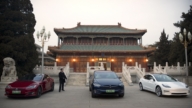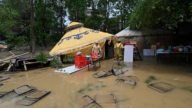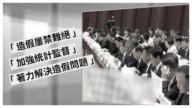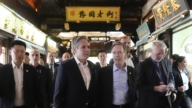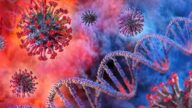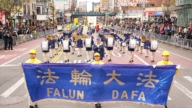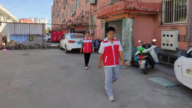【新唐人2014年07月07日訊】今年的7月7號,是抗日戰爭爆發七十七週年的紀念日,今年大陸官方表現出高調紀念的姿態。由「侵華日軍南京大屠殺遇難同胞紀念館」、和《新華網》共同籌辦的 「國家公祭網」7月6號正式上線。歷史中的抗日戰爭真相,一直被中共掩蓋,現在中共高調紀念,是為了甚麼?下面請看歷史學者的分析。
大陸官方媒體公布,7月7號上午,中共高層將到抗日戰爭紀念館,隆重紀念抗日戰爭爆發七十七週年。同時,《央視》、《央廣》和一批官方網站都將直播。
1937年7月7號,日本在侵佔中國東北6年後,藉機挑起「盧溝橋事變」,正式全面發動了侵華戰爭。到1945年9月9號,日軍宣告無條件投降。當時的「中華民國」政府軍傷亡322萬多人,其中陣亡的約132萬人。中國軍民總傷亡人數大約是3,600萬。僅在當時的首都南京就有大約30萬平民被屠殺。
中共建政後,一直宣稱他們是抗日的主力,批評國民黨是假抗日或不抗日。據史料顯示,七七事變後10天,蔣介石發表了著名的「最後關頭」演說,他提出「犧牲到底、抗戰到底」的決心。整個抗戰期間,國軍中、少將以上的將軍,共犧牲206人。中共將領中只有2人陣亡。
旅澳原首都師範大學副教授李元華:「共產黨不管它怎麼宣傳,但是今天拿不出來主戰場上跟日本人真槍實彈的交火,沒有!實際上它利用民族危難的時候,積攢自己的力量,然後篡權。主戰場上一直是國民黨站在抗日的最前沿,出現了很多民族英雄。」
然而在抗戰結束至今,中方從未要求日本進行戰爭賠款,甚至在日本「731細菌部隊」對被俘人員進行人體活體實驗、和強徵中國「慰安婦」等證據曝光後,中共也從未向日本正式提出要求賠償。那麼,北京現在為甚麼突然高調紀念「七七事變」呢?
李元華:「中共一在國內遇到很大的難題,就要樹立在海外的假想敵,比如像美國、日本。拿日本一直作為一種王牌,因為日本在歷史上有侵華戰爭。中共以所謂的愛國,把全民的精力都用在假想敵上面,而忽略中共自己的問題,轉移百姓視線、情緒,好像它就有出路了。」
大陸媒體連日來在頭條板塊,高調報導部分日本軍人厭倦軍隊生活想「自殺」,和吉林省檔案館保存的日軍屠殺中國民眾的記錄,以及日軍士兵的信件證實,日軍在華使用化學武器、和細菌武器等日軍侵華證據。
旅美歷史學者、原山東大學副教授劉因全:「他們想轉移國內人的視線。當國內矛盾突出的時候,統治者為了來緩和矛盾,就故意的來製造一些對外的緊張空氣。像國內好多人希望要搞民主,香港人民要求直接選特首,爆炸案、殺人案,都是非常嚴重。」
檔案管理人員:「這批資料是直接參加部隊作戰的士兵,他們所記錄的、記載的東西。表明瞭日軍在戰場上直接使用細菌部隊,去參加作戰,那麼包括著名的、臭名昭著的731部隊。」
劉因全:「其實這肯定以前就有啦,只是有意的掩蓋,不願意公布出來。特別是江澤民這樣的一些賣國賊,他們更不願意把這些東西公布出來。不大可能採取一些實質性的一些行動,估計也就是喊一喊就算了。」
另外據考證,中共前黨魁毛澤東曾7次感謝日本侵華。其中最著名的是1972年9月,時任日本首相的田中角榮訪華時,曾就二次世界大戰中日本侵略中國而道歉,毛澤東當即表示:感謝日軍教育了中國人民,還說「沒有你們的皇軍,我們不可能奪取政權。」
採訪編輯/唐音 後製/李智遠
What’s Behind the CCP’s High-Profile Commemoration of Sino-Japanese War?
July 7 is the 77th anniversary of the Second Sino-Japanese
War, a war of resistance against Japan in China.
This year the Chinese Communist Party (CCP) shows
a high-profile attitude in commemorating the event.
A “National Memorial” website went online on June 6,
built by the Xinhua News Agency with sponsorship
from the Memorial Hall of the Nanjing Massacre.
Since the CCP has been covering up the truth of the
Second Sino-Japanese War, why such a high-profile
commemoration at the moment?
Let’s see what historians say about this.
The CCP media mouthpiece officially announced that,
in the morning of July 7, top party officials will visit
anti-Japanese memorials to commemorate the 77th anniversary
of the Second Sino-Japanese War.
CCTV, China Nation Radio (CNR) and many official
websites will broadcast the events live.
On July 7, 1937, the Lugou Bridge Incident erupted 6 years
after Japan’s invasion of Manchuria.
The incident marked Japan’s full scale invasion of China.
The war last until September 9, 1945 when Japan
unconditionally surrendered.
The casualties of the Republic of China (ROC) army
were over 3.22 million, with the loss of 1.32 million.
Overall Chinese casualties were about 36 million.
In Nanjing alone, then capital of the ROC, about 300,000
civilians were killed in a massacre by Japanese troops.
After coming to power, the CCP had always criticized
the ROC for fake resistance against the Japanese,claiming
that the CCP were the main resistance force.
But according to historical record, 10 days after the Lugou
Bridge Incident, Chiang Kai-shek made his famous speech
“The Limit of China’s Endurance,"
in which he said “we can only sacrifice and fight to
the bitter end” as the Japanese challenged that limit.
During the following war against Japan, the ROC
lost 206 general-rank officers. In comparison,
the CCP only lost 2 of its general-rank officers.
Li Yuanhua, former associate professor at Capital Normal
University:”No matter what the CCP says in its propaganda,
it can offer no evidence of any real fight against the Japanese
in the main battlefield.
The truth is the CCP had been gathering strength for
usurpation in our national crisis.
It was always the Kuomintang that was fighting on the major
battlefront against the Japanese, and we see many
national heroes arising among them.”
Since the war ended, the CCP has never asked for
indemnity from Japan.
Even after the exposure of Unit 731’s live human
experimentation and Chinese comfort women’s stories,
the CCP still never formally requests any indemnity from Japan
for those crimes.
The question is then why does Beijing hold a high-profile
commemoration of the war now?
Li Yuanhua: “The CCP attempts to target ‘imaginary foreign
enemies’ such as the U.S. and Japan whenever it has
big troubles in China.
Japan is especially preferred as it historically invaded China.
The CCP uses nationalism to distract Chinese people, making
them only think about ‘enemies’ instead of
the Party’s own problems.
It tries to ‘solve problems’ by manipulating Chinese
people’s attention and sentiments”.
For days, Chinese media publish headline stories about
the war including how some Japanese soldiers had
intended to commit suicide due to war-weary feelings,
records of Japan troops slaughtering Chinese in Jilin,
and Japanese soldiers’ letters as evidence that Japan had
used chemical and biological weapons in China.
Liu Yinquan, former Chinese Professor of History:”The CCP
wants to distract our people.
When domestic problems become bad, the Party will
intentionally create tension with foreign countries
to ease the situation.
Currently many are seeking democracy in China and
Hong Kong people are fighting for universal suffrage.
Bombings and murders are also frequently seen lately.”
A Chinese history professor:”The letters were written by
the soldiers who participated in the battles in person.”
“These historical records prove that Japan sent military
forces, including the notorious Unit 731,
with biological weapons to use in the war”.
Liu Yinquan: “Those records must have been there
for a long time.
The CCP has intentionally hidden them as it is reluctant
to declare them.
Especially for traitors such as Jiang Zemin,
they are even more unwilling to do that.
I think the CCP will not make further moves on the issue
and probably it does that for propaganda purposes only.”
There are also records that former CCP leader Mao Zedong
7 times had “appreciated” Japan’s invasion of China.
The most famous one happened in September 1972 when
Japan’s Prime Minister Kakuei Tanaka made apologies
for Japan’s invasion in his visit to China.
Mao immediately replied “I appreciate the Japanese army
for educating Chinese people”,
and even said “Without your help we would never
have been able to seize power.”
Interview & Edit/TangYin Post-Production/Li Zhiyuan


